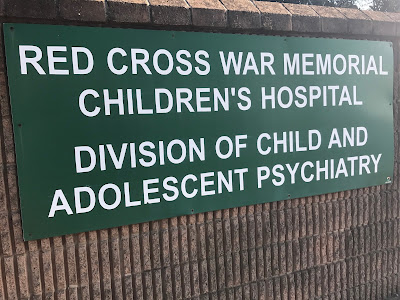"Summer" Fieldwork
 |
| This picture is mostly for my parents. Mom & Dad: this is where I work. It is not at a University or on a campus. |
Living in Cape Town (during winter) for the past 3 months has been amazing. Its economic situation and political history in the context of the rest of South Africa is enough for a series of novels.
My role here has been as a researcher and a genuine seeker of knowledge, specifically within the field of mental health and developmental disorders. Our goal is to develop a sustainable model for autism spectrum disorder (ASD) treatments through a task shifting approach which certifies non-specialist workers to coach caregivers of young children with ASD to deliver highly effective treatments by themselves. A mouthful, but let us first take a step back.
My project has been working with the Center for Autism Research in Africa out of the Division of Child and Adolescent Psychiatry at the University of Cape Town. So, first, a (very brief) explanation of ASD.
The most important things to remember is that it is a "spectrum disorder" and ranges from being very severe to unnoticeable, it is defined by behavior, mainly issues with social communication, and it does not include any issues with intelligence. Typically developing infants naturally pay close attention to their caregivers and other human faces, while children with ASD are more likely to give equal attention to everything in their surroundings. Because of this, their development tends to be slower in terms of speaking and understanding body language, which may lead to a whole host of other issues.
The current diagnostic rate in the US is approximately 1 in 68, which includes 1 in 42 boys and 1 in 189 girls. Experts are diving deep into this rate to understand if this is sex difference is biological, social, or a product of misdiagnosis. The issue with this abundance of cases is that there are not enough clinical professionals to treat this many people. This goes for the US and all other countries around the world. In comparison, the US has more than 60 times as many psychiatrists and psychologists per person as South Africa.
Doing the math, it works out that if every psychologist and psychiatrist in the entire nation of South Africa spent 136 hours per week doing ASD therapy, there would be enough to give each child 1 hour of treatment.
The psychiatrists, psychologists and occupational therapists that lead our team work with caregivers of young children with autism spectrum disorder (ASD) to achieve better developmental outcomes in two ways:
1. Early Start Denver Model (ESDM) - An intervention designed for children with ASD at an early start program in Denver, Colorado, which takes a developmental approach towards learning: it targets academic, social, and motor skills all at once through normal daily activities, such as playing with toys, eating meals, and blowing bubbles. This is in slight contrast to behavioral approaches to therapy, which are more commonly used. This method in particular is child-directed, so it is their job to take the lead on activities as the therapist adjusts to their interests.
2. Parent Coaching - Teaching caregivers ESDM therapy, so that they can use the techniques with their children 24/7. It functions much like your average youth sports game, with the therapist's role being that one parent who gets a bit too into the game, and the caregiver-child pair being teammates, working together to achieve a common goal. In the end, the growth that comes from a caregiver who goes from being unable to get their child to look that them, to being able to communicate in their own special way, is all one needs to see to understand the impact of the coaching. People cannot afford to pay for unlimited hours of therapy with their children, and there are not enough therapists to treat them all, so this works as the next logical solution.
I think having this experience has helped me learn a lot: what I want to do in life, where I see my career going, how I see myself impacting the world, and why it is important.
I want to be a Clinical Psychologist, working with children and families, specifically on community-level issues that deter development.
I see myself organizing research projects at home and abroad that promote individual and societal level improvements in social dynamics.
It doesn't stop there, because research is not about what you can do for others, but about what others will do for themselves.
Mental health is vastly overlooked in all sectors of our society: medicine, law, sport, entertainment, politics, etc. We live in a toxic society that was built on the oppression of others and refuses to acknowledge that the history mirrors the present. It is on us to be the ones that continue bringing in the era of social consciousness, cultural humility, intersectionality into this world. Stay woke.
P.S. No, it is not caused by vaccines.


Comments
Post a Comment